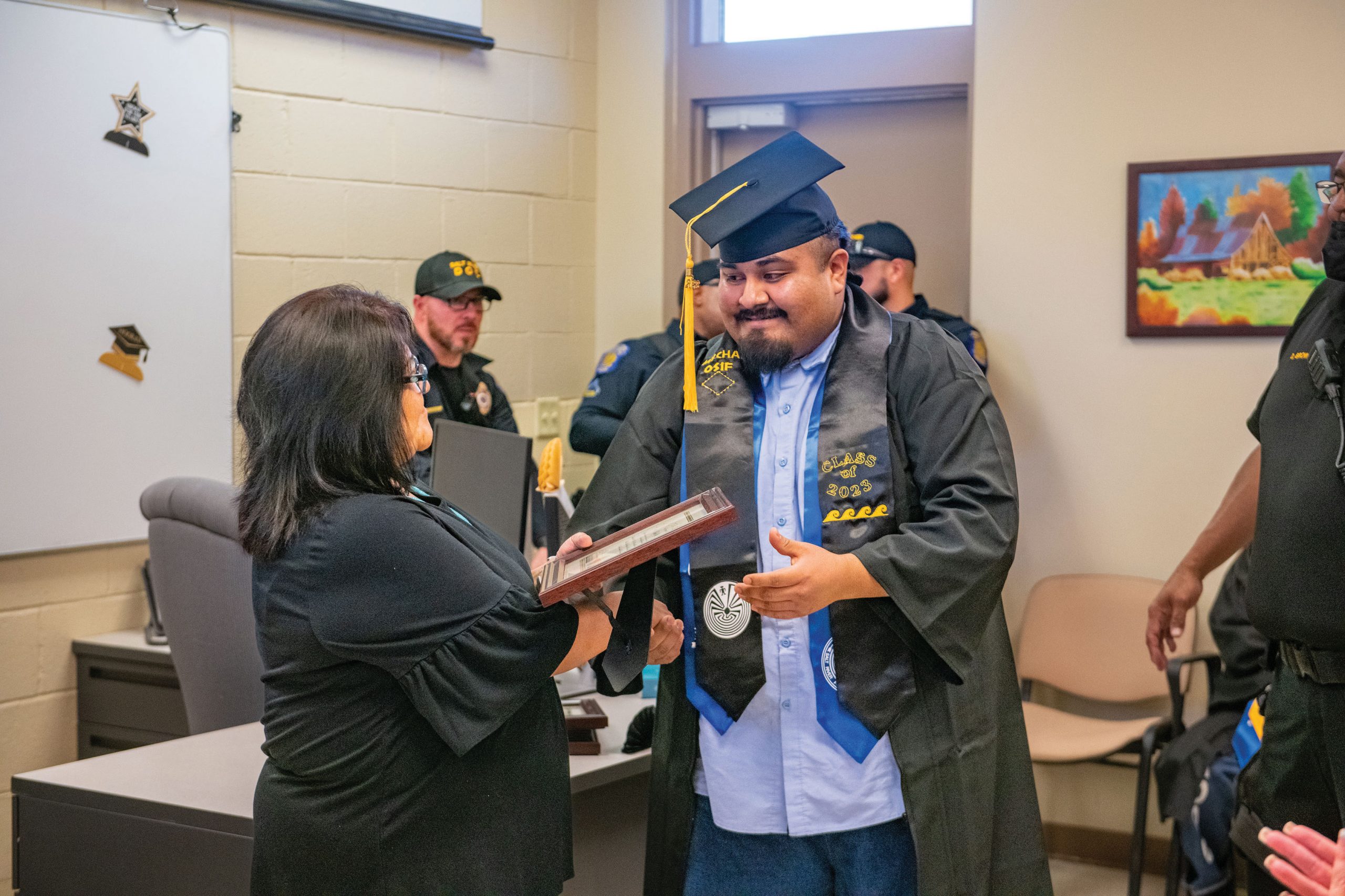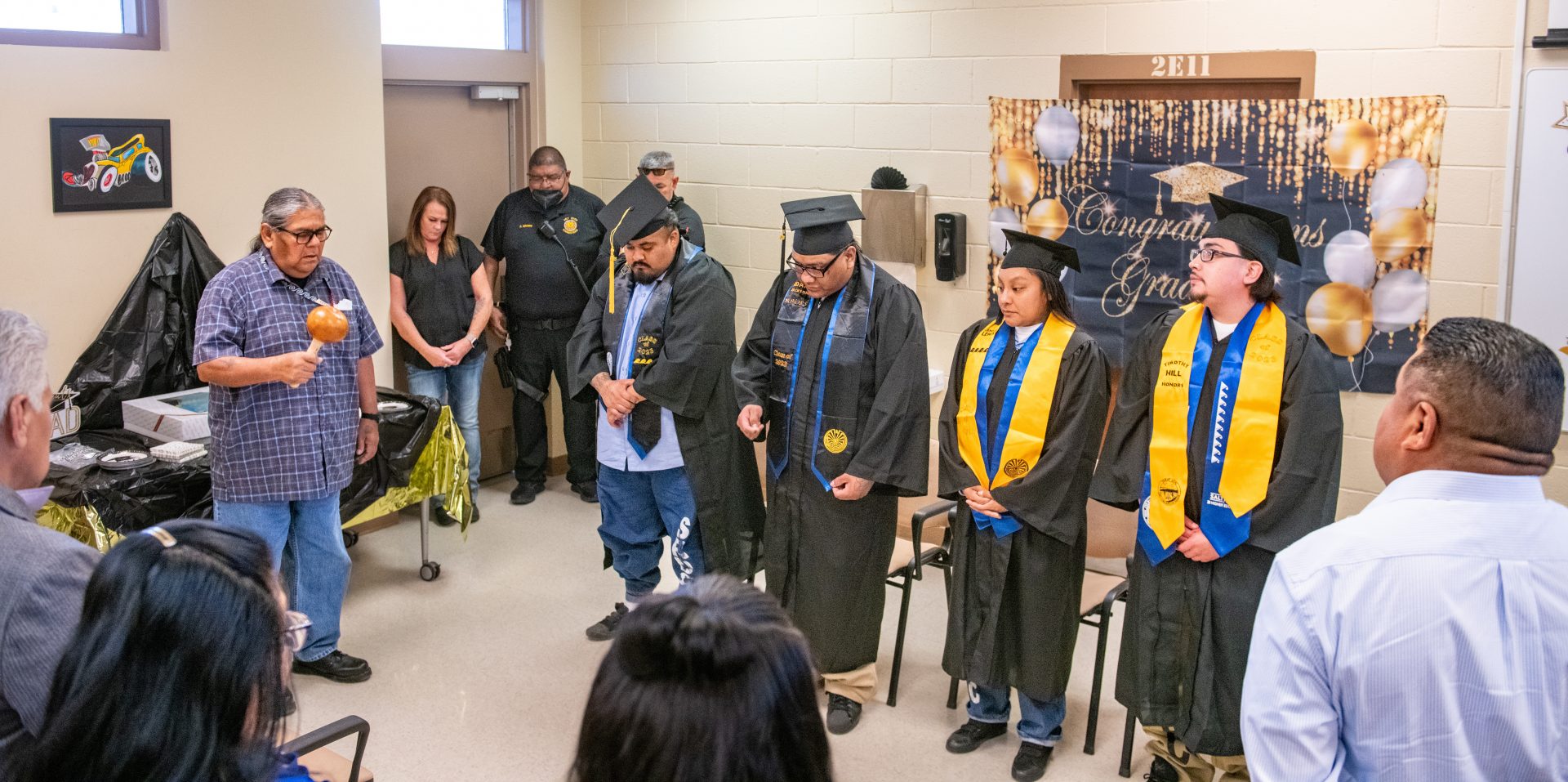VIEWS: 3356
June 15, 2023College Program Allows Inmates to Pursue Higher Education
On May 23 at the Salt River Pima-Maricopa Indian Community’s Department of Corrections (DOC) facility, several inmates were recognized for taking the opportunity to make a positive change while incarcerated. Community members under DOC supervision graduating from the Rio Salado Reentry program were recognized for obtaining a college degree from Rio Salado Community College.




To start the awards ceremony, SRPMIC President Martin Harvier said a prayer and offered his congratulations to the four individuals receiving their diplomas. He said the Community will continue to support the graduates to do the best they can to make positive changes in their lives and the lives of those around them.
SRPMIC Vice-President Ricardo Leonard offered a traditional song and prayer. He credited the individuals for taking on the task of getting an education despite the hardships they have faced. “It takes a community to ensure they find success in life. I am happy for you guys and blessed to see this, because we know it has been quite a journey to get [here] today,” said Leonard.
DOC Corrections Officer Danny Brown, who has been serving as a kind of mentor to the students, said that it was good to see leadership from the Community present at the graduation ceremony.
“I really credit [these] individuals that kept going on with their studies and going on with their journey through the turmoil that we all endured during that time,” said Brown about the students’ experiences throughout the COVID-19 pandemic and being incarcerated.
Brown said that, to him, the important part is to talk to the inmate-students and see where they are in their studies and what they are going through as individuals.
“I am really proud of them. I talk to them all the time, [encouraging them] to keep at it (their studies) so they don’t fall off … also so once they leave, they don’t come back and start from square one,” said Brown.
According to Brown, the reentry program started in 2016 to give inmates an opportunity to further their education. “Sometimes [these] individuals are overlooked, or they have not been encouraged to do something they didn’t think they could,” said Brown.
The GED program allows incarcerated students to obtain their high school diploma and then, if they choose to, to enroll in the college program. Brown said individuals are sometimes apprehensive, but once they realize what they are capable of, they start to “take off.” He said it is remarkable how much progress some of the students make, moving away from their previous activities and moving toward their education.
Higher Education Program Advisor Danielle Prieto said it was good to see the graduates meet their milestones. “There were times when they wanted to give up, but they [knew they could] do it,” said Prieto, who said everyone has a hidden talent and that it is not too late to get a start on an education.
Graduate Mychal Osif, who received his certificate in Business Start-Up, thanked everyone for turning out for the graduation. “It feels so good to know that there are so many of you guys that really care about what [we] do … it means a lot to me,” said Osif.
He said it wasn’t easy, but he thanked the staff for helping him with words of encouragement, as there were times when he felt like giving up. “I am at a point where I feel like I need a break, but then again I have to tell myself to keep pushing, because it is preparing me for when I get released,” said Jackson.
Another student, Timothy Hill, said that the graduation was a surreal moment for him, because all he ever pictured himself doing was serving out his sentence. But taking college courses changed his self-perception and his ideas of what he could accomplish and obtain his Associates of Arts degree.
Hill said that although it is somewhat sad that he had to be incarcerated before he could see his potential, he knows that there are plenty of people who are there to help him and the other students get through their struggles.

“I really appreciate the officers as individuals, like Brown, who were helping me along the way when they didn’t have to do it,” said Hill.
As of now, Rio Salado Community College is the only educational institution in Arizona that offers college programs in the correctional system at the state, federal and tribal levels. According to Brown, even though a corrections facility may seem like an out-of-the-ordinary location for college education, it shows that the Community cares about the inmates and is not giving up on them.






